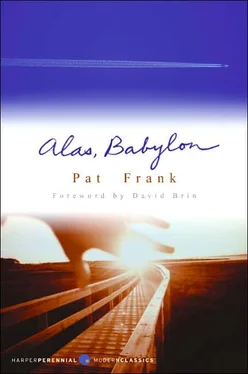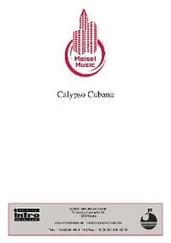Randy walked to the bar-counter and began to sharpen his razor. The razor was a six-inch hunting knife. He honed its edges vigorously on a whetstone and then stropped it on a belt nailed to the wall. A clean, smooth, painless shave was one of the things he missed, but not what he missed most.
He missed music. It had been a long time since he had heard music. The record player and his collection of LP’s of course were useless without electricity. Music was no longer broadcast, anywhere. Anyway, his second and last set of batteries for the transistor radio was losing strength. Very soon, they would have neither flashlights nor any means of receiving radio except through the Admiral’s short wave. WSMF in San Marco was no longer operating. Something had happened to the diesel supplying the hospital and the radio station and it was impossible to find spare parts. This was the word that had come from San Marco, eighteen miles away. It had required two days for the word to reach Fort Repose.
He missed cigarettes, but not so much. Dan Gunn still had a few pounds of tobacco, and had lent him a pipe. Randy found more pleasure in a pipe after each meal, and one before bedtime, than he had ever found in a whole carton of cigarettes. With tobacco so limited, each pipe was a luxury, relaxing and wonderful.
He missed whiskey not at all. Since The Day, he had drunk hardly anything, nor found need for it. He no longer regarded whiskey as a drink. Whiskey was Dan Gunn’s emergency anesthetic. Whiskey, what was left of his supply, was for medical use, and for trading.
He missed his morning coffee most. It had been, he calculated, six or seven weeks since he had tasted coffee. Coffee was more precious than gasoline, or even whiskey. Tobacco could be grown, and doubtless was being grown in a strip all the way from northwest Florida to Kentucky, Maryland and Virginia in the rural areas still habitable. Whiskey you could make, given the proper equipment and ingredients. But coffee came from South America.
Randy tested his knife on a bit of paper. It was as sharp as he could ever make it. He went into the bathroom and showered. The cold water no longer chilled him as it had through January and February. He was inured to it. Soap he used sparingly. The house reserve was down to three cakes.
He dried and stepped on the scales. One fifty-two. This was exactly what he had weighed at eighteen, as a freshman at the University. Even after three months on the line in Korea, he had dropped only to one fifty-six. He had lost an average of a pound a week for the past sixteen weeks, but now, he noted, his weight loss was slower. He had held one fifty-two for the past three days. He was leaner and harder, and, truthfully, felt better than before The Day.
There was a knock on the living-room door. That would be Peyton. He slipped on his shorts and said, “Come in.”
Peyton came in, carefully balancing the tiny pot of steaming water allotted for his morning shave. She set the pot before him on the counter as if it were a crystal bowl filled with flowers. “There,” she said. “Can I watch you shave this morning, Randy?” The sight of Peyton enriched Randy’s mornings. She was brash and buoyant, bobbing like a brightly colored cork in the maelstrom, unsinkable and unafraid. “Why do you like to watch me shave?” he asked.
“Because you make such funny faces in the mirror. You should see yourself.”
“I do.”
“No, you don’t really see yourself. All you watch is the knife, as if you’re afraid of cutting your throat.”
Dan Gunn came out of the bedroom, dressed in Levi’s and a blue checked sports shirt. Until The Day, Dan had used an electric razor. Now, rather than learn to shave with a knife or what ever was available, he did not shave at all. His beard had bloomed thick and flaming red. He looked like a Klondike sourdough or Paul Bunyan transplanted to the semi-tropics. On those rare days when his beard was freshly trimmed and he dressed formally in white shirt and a tie, he looked like a physician, outsized 1890 model.
“You can’t watch today,” Randy told the child. “I want to talk to Doctor Gunn.” He poured his hot water into the basin and returned the pot to Peyton. Peyton smiled at Dan and left.
Randy soaped and soaked his face. “Did you know that Einstein never used shaving soap?” he said. “Einstein just used plain soap like this. Einstein was a smart man and what was good enough for Einstein is good enough for me.” He scraped at his beard, winced, and said, “Einstein must have had an awfully good razor. Einstein must’ve used a fresh blade every morning. I’ll bet Einstein never shaved with a hunting knife.”
Dan said, “I had an awful dream last night. Dreamed I’d forgotten to pay my income tax and was behind in my alimony and the Treasury agents and a couple of deputy sheriffs were chasing me around the courthouse with shotguns. They finally cornered me. They were arguing about whether to send me to the Federal pen or state prison. I tried to sneak out. I think they shot me. Anyway, I woke up, shaking. All I could think of was that I really hadn’t paid my income tax, or alimony either. What day is it, anyway?”
“I don’t know what day it is but I know the date. April fourteenth.”
Dan smiled through the red beard. “My subconscious must be a watchdog. Income tax day tomorrow. And we don’t have to file a return, Randy. No tax. No alimony. Let us count our blessings. Never thought I’d see the day.”
“No coffee,” Randy said. “I would gladly pay my tax tomorrow for a pound of coffee. Dan, if you drive to town today I want to go with you. I want to trade for coffee.”
Dan had evolved a barter system for his services. He charged a gallon of gas, if the patient had it, for house calls. Most families had somehow managed to obtain and conserve a few gallons of gasoline. It was their link with a mobile past, insurance of mobility in some emergency of the future. Sickness and injury were emergencies for which they would gladly dip into their liquid reserve. Dan made little profit. Perhaps half his patients were able and willing to pay with gasoline. Still, he managed to keep the Model-A’s tank nearly full, and on his rounds he was continuously charging batteries. Bill McGovern had instituted a system of rotating the batteries in the car. In turn, the charged batteries powered Admiral Hazzard’s short-wave receiver. Not only was the car transport for Randy’s water-linked enclave of families, it was necessary to maintain their ear to the world outside. Not that the world, any longer, said much.
Dan said, “Sure, Randy, but it’s going to take all morning. I’ve got a bad situation in town.”
“What’s the trouble?”
From downstairs they heard Helen’s voice, “Breakfast!”
“Tell you later,” Dan said.
Randy was last to reach the dining room. There was a tall glass of orange juice at his place, and a big pitcher of juice in the center of the table. Whatever else they might lack, there was always citrus. Yet even orange juice would eventually disappear. In late June or early July they would squeeze the last of the Valencias and use the last grapefruit. From then until the new crop of early oranges ripened in October, citrus would be absent from their diet.
He saw that this morning there was a single boiled egg and small portion of broiled fish left over from the night before. “Where’s my other boiled egg?” he said.
“Malachai only brought over eight eggs this morning,” Helen said. “The Henrys have been losing chickens.”
“What do you mean, losing them?”
“They’re being stolen.”
Randy put down his juice. Citrus, fish, and eggs were their staples. A drop in the egg supply was serious. “I’ll bet it’s an inside job,” he said. “I’ll bet that no-good Two-Tone has been swapping hens for liquor.”
Читать дальше












